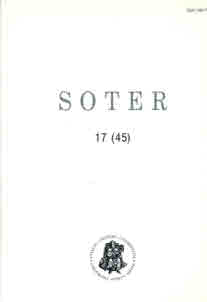Dievo paslėptis – krikščioniškumo dėmuo ir iššūkis filosofijai
God’s hiddenness – the principle of christianity and the challenge for philosophy
Author(s): Arūnas BignelisSubject(s): Christian Theology and Religion
Published by: Vytauto Didžiojo Universitetas
Summary/Abstract: For many people the fact that God (we mean by God as represented in the historic Jewish and Christian theistic traditions) has not made His existence sufficiently evident is first and foremost a source of existential concern.This is so because the hiddenness of God raises difficult existential questions concerning the meaning, value or purpose of our lives. But this sort of questions (i.e. existential) is not a direct subject of this article. The fact of divine hiddenness allegedly poses another sort of questions, too – cognitive problems for theism. In an important recent book, Divine Hiddenness and Human Reason, John L. Schellenberg has presented an argument that the extent to which evidence for the existence of God is not forthcoming, in conjunction with certain other plausible assumptions, entails the truth of atheism. In brief, his atheistic argument is this: (1) An unsurpassably loving God (allegedly existing in hiddenness) would desire personal relationship to obtain between himself and every person capable of it. (2) A logically necessary reason for such interpersonal relationship is human belief in God’s existence. (3) If an unsurpassably loving God existed, He would ensure that each person capable of personal relationship with Him was in possession of sufficient evidence for such belief in God’s existence. (4) But the inculpable nonbelievers exist, that is persons who sincerely and honestly search for God but do not find Him. (5) Therefore, an unsurpassably loving God does not exist. The aim of this article was to inquire, from the point of view of formal logic, into the structure of Schellenberg’s atheistic argument, to explicate its premises and to demonstrate its formal validity. Afterwards the critical analysis is concentrated on the content of the premises of this argument, especially on the assumption (3) and its specific content. The analogy of the philosophical concept of God’s hiddenness has been found in Joseph Ratzinger’s well-known theological work Introduction to Christianity, namely, as the third principle of the structure of Christianity – God’s incognito law. The „forerunners“ of the Christian incognito law in Greek philosophy (Plato, Aristotle) are discussed. The paradoxical character of the content of incognito law and the ultimum of Plato and Aristotle is disclosed. Scientific methods are not sufficient for the final verification of the existence or non-existence of the entities the manifestations of which are presented in a paradoxical mode. The temptation to reduce God’s incognito (divine hiddenness) to man’s cognition is really great. Hence, objective methods themselves are not sufficient for the estimation if the revelation of God has actually happened or not. Philosophical positions of the Lithuanian philosopher Antanas Maceina and Michael J. Murray are presented as examples of the theistic argument against Schellenberg’s atheistic argument.
Journal: SOTER: religijos mokslo žurnalas
- Issue Year: 45/2006
- Issue No: 17
- Page Range: 7-17
- Page Count: 11
- Language: Lithuanian

